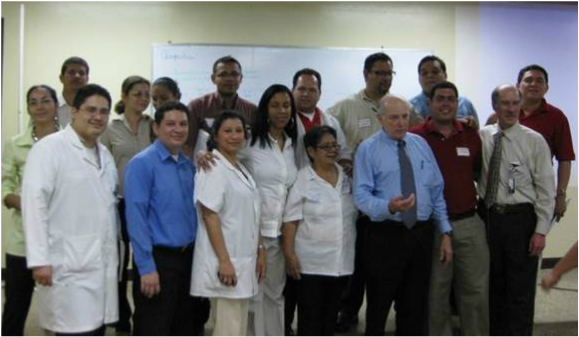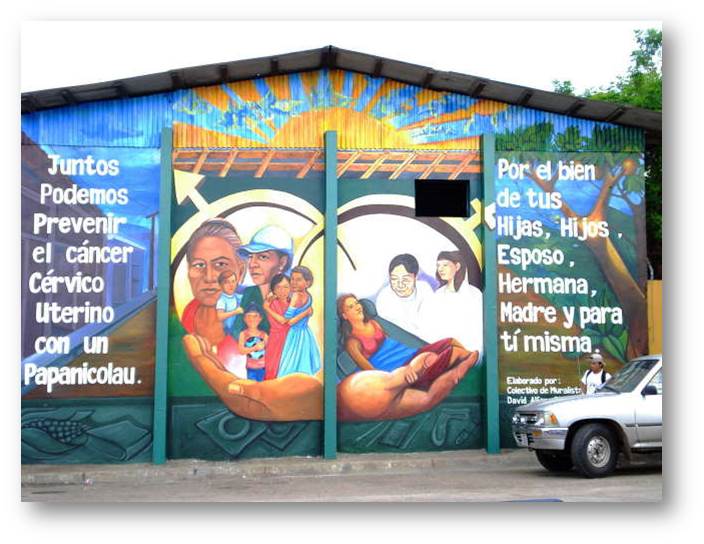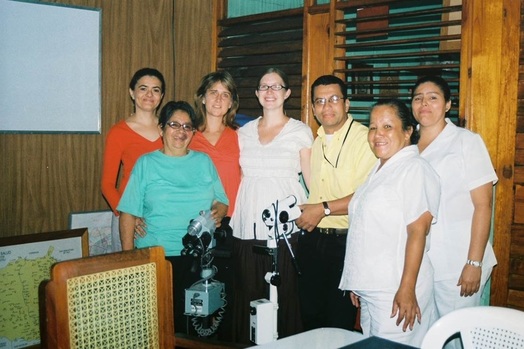
Nicaragua, the second poorest country
in the Western Hemisphere, has the highest rate of cervical cancer in Central
America. It is a common killer of women in Nicaragua, including young women. The Cervical Cancer Initiative is a
public-private partnership between ICAS/Juntos Adelante, Mama Licha's Clinic
and El Centro de Salud (Esteli's public health clinic). The goal of the
initiative is to train, equipand empower local health professionals to effectively
use colposcopy, cyrotherapy and Loop Electrosurgical Excision Procedure (LEEP) to follow up and treat abnormal pap smears in
order to lower rates of cervical cancer.
Even with universal health care, Nicaragua's public health system lacks the necessary medical equipment and training to adequately address this significant health burden. Cervical cancer can be prevented with early detection and treatment.
When Juntos Adelante started its work in Esteli over ten years ago, the community of 120,000 people had very few resources in the public health system to follow up on abnormal pap smears. The Centro de Salud did not have a single colposcope that is needed for follow up to confirm diagnosis on an abnormal pap smear, leaving patients topay out-of-pocket for a colposcopy at a private clinic at the cost of costs $50 -- an average month's salary. Because of inability to pay for colposcopies, the extreme alternative of performing a hysterectomy was practiced, leaving women infertile.
Dr. Stephanie Cox-Batson regularly travels from Chicago, Illinois to Esteli to evaluate firsthand the initiative’s progress, meet with local nurses and physicians, train to local providers and provide direct patient care. ICAS/Juntos Adelante and Dr. Cox-Batson have actively recruited OB/GYN specialists for the initiative, and led a conference in Managua with American Society of Colposcopy and Cervical Patholog (ASCCP) to train Nicaraguan residents from throughout the country. Upon Centro de Salud's request, ICAS/Juntos sponsored a local training for all Esteli health care system providers in "see and treat" method, where providers could identify and treat gynecological problems in one visit. The long term goal of the initiative is to insure that the local health professionals wbecome self sufficient And move away from the extreme treatment that is preventable in many cases.
One of the strengths of the Cervical Cancer Initiative is building on a decade of trust between U.S. based specialists and the local providers in the Nicaraguan public health system. Over the past ten years, ICAS/Juntos Adelante has equipped the main public health center and five rural locations in Esteli in order to offer patients integrated services with colposcopy, LEEP and cryo-therapy to halt the progression of abnormal cervical cells, help prevent cervical cancer and increase access for women who have received an abnormal pap.
Even with universal health care, Nicaragua's public health system lacks the necessary medical equipment and training to adequately address this significant health burden. Cervical cancer can be prevented with early detection and treatment.
When Juntos Adelante started its work in Esteli over ten years ago, the community of 120,000 people had very few resources in the public health system to follow up on abnormal pap smears. The Centro de Salud did not have a single colposcope that is needed for follow up to confirm diagnosis on an abnormal pap smear, leaving patients topay out-of-pocket for a colposcopy at a private clinic at the cost of costs $50 -- an average month's salary. Because of inability to pay for colposcopies, the extreme alternative of performing a hysterectomy was practiced, leaving women infertile.
Dr. Stephanie Cox-Batson regularly travels from Chicago, Illinois to Esteli to evaluate firsthand the initiative’s progress, meet with local nurses and physicians, train to local providers and provide direct patient care. ICAS/Juntos Adelante and Dr. Cox-Batson have actively recruited OB/GYN specialists for the initiative, and led a conference in Managua with American Society of Colposcopy and Cervical Patholog (ASCCP) to train Nicaraguan residents from throughout the country. Upon Centro de Salud's request, ICAS/Juntos sponsored a local training for all Esteli health care system providers in "see and treat" method, where providers could identify and treat gynecological problems in one visit. The long term goal of the initiative is to insure that the local health professionals wbecome self sufficient And move away from the extreme treatment that is preventable in many cases.
One of the strengths of the Cervical Cancer Initiative is building on a decade of trust between U.S. based specialists and the local providers in the Nicaraguan public health system. Over the past ten years, ICAS/Juntos Adelante has equipped the main public health center and five rural locations in Esteli in order to offer patients integrated services with colposcopy, LEEP and cryo-therapy to halt the progression of abnormal cervical cells, help prevent cervical cancer and increase access for women who have received an abnormal pap.


